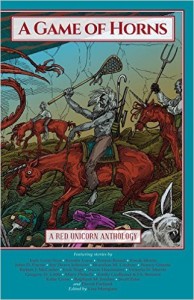I had a nice conversation with occasional Fictorians guest poster Petra Klarbrunn about how she ended up becoming a writer. Here’s a mini-interview that gives a good explanation as to why some folks write.
Guy Anthony De Marco
When I walk into Everyday Joe’s Coffee House in Fort Collins, Colorado, it takes all of ten seconds to locate Petra Klarbrunn. A prolific author who writes under at least ten pseudonyms, she built a temporary wall of research books around her clunky pre-Lenovo IBM laptop to keep the world at bay. Her face remains focused on her computer, fingers pounding away on keys polished blank and smooth from years of hard use.
I place my order for an espresso and a cup of Earl Gray for Petra. While the volunteer baristas expertly craft the brews, I realize that my author friend looks more like a librarian than a writer of bizarro stories and niche erotica novellas. Her round Harry Potter-esque glasses are oversized for her small features, and tattoos of Marvel comic book heroes peek out from around her well-worn Batman t-shirt. Everything about her is a clash between multiple worlds. Marvel versus DC. Demure librarian versus hardcore literary dominatrix.
She remains in her own bubble universe until I pierce her event horizon by sliding the ceramic mug of steaming tea into the only open spot within her reach. Her clear blue eyes lock onto mine and she flickers the corners of her mouth upwards.
“Gimme a minute to finish this scene, would you?”
Nodding, I take the opposite chair at her table and locate a few spare inches of table space to set my cup. The coffee house is half-full of students from Colorado State University, and Petra blends in seamlessly. I’m easily the oldest person in the place. Most of the students are working on homework or socializing. Several kept glancing at the attractive brunette with the loud keyboard. Once I had settled in, even more eyes wandered towards our table. Was I her father, her friend, or something more? The enigma baffled the college crowd.
Petra finally pushes the screen down on her laptop, the old hinges squealing in protest, and she looks up with a lopsided grin. “I had to get that scene down before I forgot it.”
“What are you writing about today?” I asked while adding a little brown packet of raw sugar to my espresso.
“Chick porn.” She laughs with a clear soprano voice when a barista stops in his tracks at her words and then continues on as his face turns red. “Gotta pay the bills. This one is set in Ireland.” She waves at the books piled on the table with the grace of a ballerina. All of them pertain to some aspect of the Emerald Isle, ranging from travel books to historical castles. “I love to travel. One day I’ll make it out to Europe. I’m keen on visiting Wales, Ireland, and especially Scotland.”
When pressed why she wanted to go to Scotland, it was her turn to redden her complexion. “It’s the kilts. I can’t resist someone manly enough to basically wear a skirt and drink Scotch.”
Sex, a travel bug, and a sad childhood are what started Petra’s foray into writing erotica novellas for women and, to a lesser extent, for QUILTBAG readers. “It allowed me to travel virtually for a while, burying my head in travel books and online forums so I could forget my problems. Eventually, I had to get off of my butt and go see things without having to peer through a window made by IBM. By the time I was ready to get on a plane, I had 33 erotic novellas published under a couple of different pseudonyms. I made enough to cover my living expenses and to travel to my first exotic location – Los Angeles.” Her laugh is contagious, and eventually everyone in the coffee house is smiling.
When asked about her family, Petra admits she barely remembers her father. She does remember the tears and the sobbing that gripped her mother. “I was, what, five or six years old. I couldn’t understand what was wrong with my mom. She was Wonder Woman to me…indestructible, yet loving and warm. To see her so broken up, it broke my heart.”
Those feelings haunted Petra. In grade school, she fought so often that the principal joked he was going to adopt her because they saw each other more than he saw his own kids. “I was a terrible hellion. The girls start growing faster than the boys, and they were all afraid of me. I never had to wear make-up because I had a bruise or a black eye. Maybelline Fist, I used to call it.”
Unfortunately, when the boys started their growth spurts, she remembered the principal saying that she had better start to use her brain instead of her fists if she wanted to survive. “That made sense to me. Someone talking to me like I was an adult, telling me things that made logical sense…that was the game changer for me.”
Several bleak Christmas holidays in a row, one of them requiring a midnight jaunt to a park to locate a suitable shrub so she and her mother could have a tree to decorate, convinced Petra to settle on a career choice. She heard about the lofty advances that authors like Stephen King were pulling down, so that seemed like an easy method to get rich. “My god, what an idiot I was. Still am, now that I think of it.” She laughs and snorts, which causes her to laugh uncontrollably for several minutes.
“I was the proverbial broke, struggling writer until I wrote my first erotica—based in Scotland, of course. My roommate read it straight through and convinced me it was fantastic. I uploaded it to Amazon’s Kindle Digital Publishing platform, and it began to sell. I made more money the first month than I did waiting tables. I wrote another one in a week, and that one did even better. I kept writing, and the books got better and better as I learned my craft. I now make enough to pay my bills, my mom’s bills, and I’m taking her on a two-week vacation to Scotland next month.” That lopsided grin lights up her features again. “We’re going to drink real scotch and find out what’s hidden under those kilts. It’s my mission in life now.”




